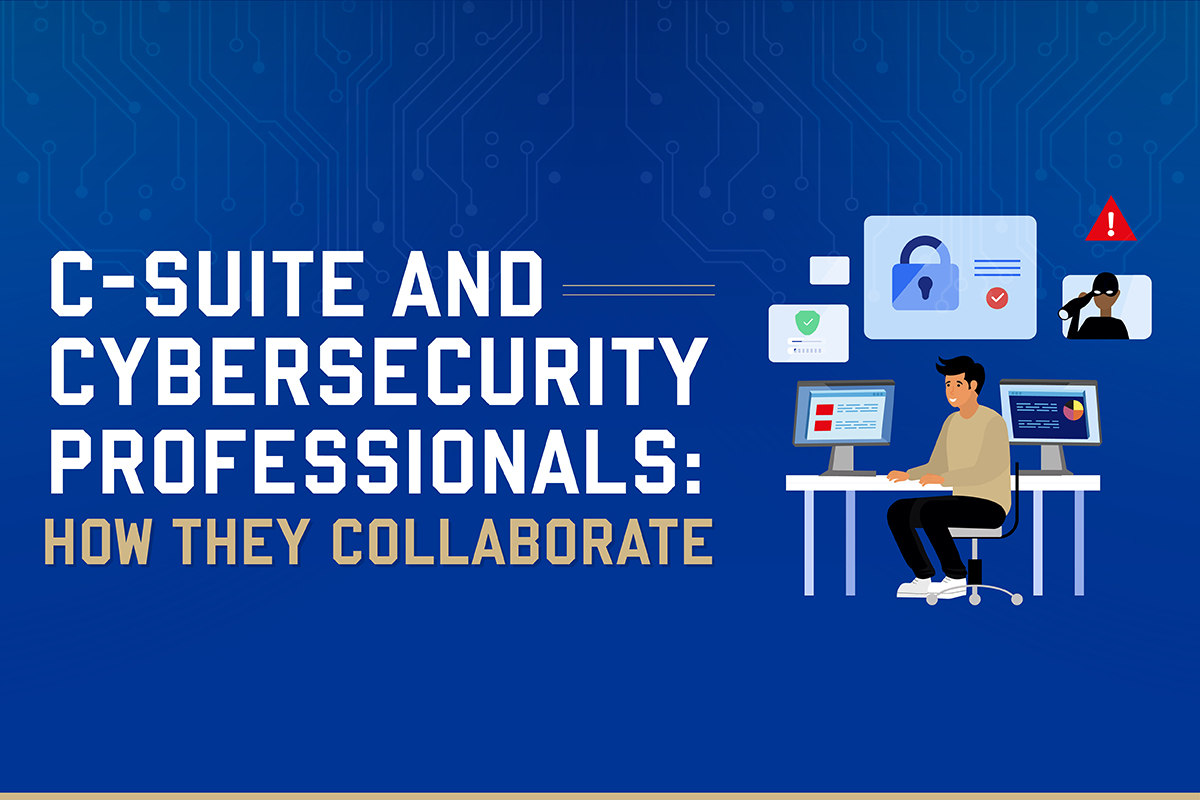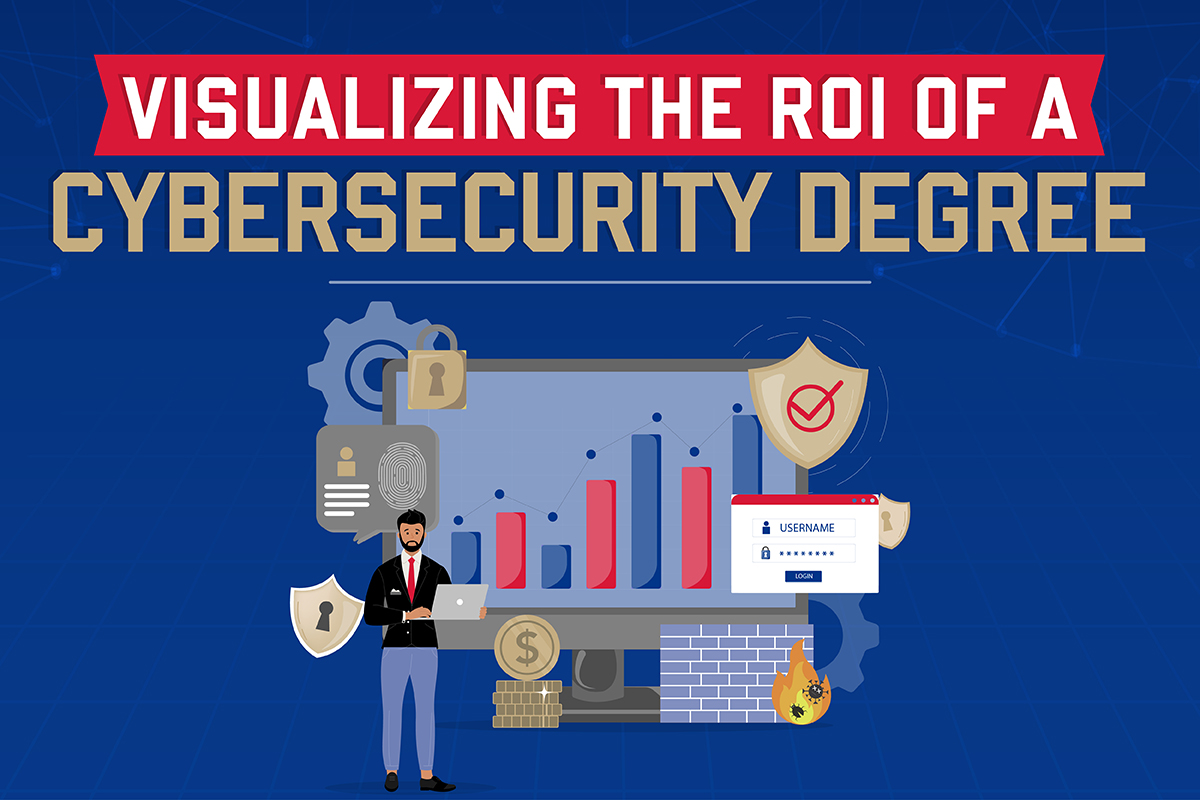Do You Need a Degree for a Cybersecurity Career?
Written by:
University of Tulsa
• Jan 30, 2025

With cyber threats growing in sophistication and complexity, businesses, nonprofits, and government agencies are scrambling to protect their networks and data. As a result, the cybersecurity field is booming. In fact, the U.S. Bureau of Labor Statistics reports that there will be a 33% job growth for information security analysts between 2023 and 2033, which equates to around 17,300 new openings each year on average. Individuals looking to capitalize on this outlook may be wondering if they need a degree for a cybersecurity career.
Although it’s possible to enter the cybersecurity field with no formal education, many find that earning a cybersecurity degree better positions them to earn certifications and take on high-profile roles that require enhanced training, technical skills, and professional certifications.
Here we’ll explore what a cybersecurity degree entails, its benefits, its key objectives, and the common career paths graduates pursue. To help aspiring cybersecurity professionals compare career trajectories, we will also look at cybersecurity roles that don’t require a degree.
Can You Get a Job in Cybersecurity Without a Degree?
It is possible to get a job in cybersecurity without a degree. The cybersecurity field values skills, certifications, and practical experience, which means that motivated individuals with the right training can enter the field without formal academic credentials.
However, without a degree, candidates often only qualify for entry-level positions that serve as stepping stones to more advanced roles. Here’s a look at some common entry-level cybersecurity jobs and what they entail.
Cybersecurity Specialist
Cybersecurity specialists monitor and maintain an organization’s security systems to ensure they are operating effectively. Their duties include analyzing security alerts, updating firewalls, and assisting with the implementation of new security protocols. This role requires cybersecurity technical skills and knowledge of network security basics.
According to Payscale, information security specialists, including cybersecurity specialists, have a median annual salary of about $83,000 as of December 2024. Top-earning specialists make up to $133,000 per year.
Cybercrime Analyst
Cybercrime analysts work closely with law enforcement or private organizations to investigate and analyze cyber attacks. They collect and interpret data to identify the source of the crime, determine its impact, and implement protections that prevent future occurrences. This role is ideal for individuals interested in the forensic side of cybersecurity who thrive in a collaborative environment.
Payscale reports that cybersecurity analysts — an alternative title for cybercrime analysts — have a median annual salary of around $81,800, per its December 2024 data. Earners in the top 10th percentile make up to $122,000 per year.
Incident and Intrusion Analyst
Incident and intrusion analysts respond to security breaches and monitor systems for signs of suspicious activity. They investigate alerts, document incidents, and recommend steps to improve a system’s defenses. Their work is critical to minimizing the impact of cyber attacks on an organization.
Payscale reports incident response analysts have a median annual salary of around $68,400, per its December 2024 data, with top earners making up to $97,000 per year.
IT Auditor
IT auditors evaluate an organization’s information technology (IT) systems and processes to ensure they are compliant with security standards and regulatory requirements. They assess a system’s vulnerabilities, recommend improvements, and provide reports to help their organization strengthen its defenses. This role requires a combination of technical expertise and analytical and communication skills.
According to Payscale’s October 2024 data, IT auditors have a median salary of around $78,300 per year. Earners in the top 10th percentile make up to $119,000 per year.
What Is a Cybersecurity Degree Program?
Do you need a degree for a cybersecurity career? Technically, no. However, a cybersecurity degree is a valuable asset and can serve as a key component of an individual’s preparation for long-term career growth.
A cybersecurity degree program equips students with the knowledge and skills needed to identify, prevent, and respond to cyber threats. These programs focus on preparing individuals to safeguard sensitive information and critical systems in an increasingly digital world.
Cybersecurity Degree Key Objectives
Cybersecurity degree programs prepare students for the complexities of modern digital security. As cyber threats increase in prevalence and sophistication, organizations are recognizing they need skilled professionals to protect their networks, systems, and data. The following sections explore the key objectives of cybersecurity degree programs and how they equip individuals with the necessary skills and knowledge to excel in the field.
Learn to Analyze and Mitigate Cyber Risks
Developing the ability to identify and assess potential vulnerabilities in a system or network is a key objective in any cybersecurity program. Students learn to perform risk assessments and create strategies to effectively mitigate those risks. By studying real-world case studies and scenarios, cybersecurity students gain insight into how cyber attacks unfold and how to proactively counter them.
Gain Hands-On Experience With Cybersecurity Tools and Technologies
To succeed as a cybersecurity professional requires practical skills and experience using industry-standard tools and technologies. Cybersecurity degree programs include courses that allow students to work with firewalls, intrusion detection systems, encryption software, and vulnerability assessment tools. These hands-on experiences simulate real-world environments, helping students understand how to effectively configure and manage security systems.
Develop Expertise in Combating Cyber Threats
Cybersecurity professionals must be well versed in how to combat a wide range of cyber threats, from malware and phishing incidents to advanced persistent threats (APTs) and ransomware attacks. Degree programs teach students how to identify these threats, understand their mechanics, and implement measures to prevent or mitigate their impact. This includes how to study the behaviors and tactics of cybercriminals, recognize early warning signs, and employ strategies to defend against emerging threats.
Hone Problem-Solving and Critical Thinking Skills
The cybersecurity field is dynamic and unpredictable, which means successful cybersecurity professionals are able to think critically and adapt as situations unfold. Degree programs emphasize the development of problem-solving skills through exercises such as analyzing security breaches, responding to simulated cyber attacks, and designing secure systems.
Students learn to approach challenges methodically, breaking down complex problems into manageable components and then crafting effective solutions. These critical thinking abilities enable graduates to navigate high-pressure situations and make informed decisions to safeguard an organization’s assets.
Cybersecurity Degree Topics and Coursework
Cybersecurity degree programs cover a wide array of topics to ensure graduates are prepared for the multifaceted challenges of protecting digital assets. The following sections cover key courses and topics that students can expect to learn about in a cybersecurity degree program.
Foundations of Cybersecurity
The introductory foundations of cybersecurity course provides students with a comprehensive overview of the cybersecurity field. Topics covered include the evolution of cybersecurity, basic concepts of risk management, and an introduction to certain types of cyber threats such as malware, phishing, and ransomware. Students also explore the fundamentals of securing networks, systems, and data, laying the groundwork for more advanced coursework.
Network Security
The network security course focuses on protecting data across networks, a critical aspect of safeguarding an organization’s digital infrastructure. It teaches students how to identify vulnerabilities in network systems, implement firewalls, and use intrusion detection systems to monitor and prevent unauthorized access.
Students also learn about virtual private networks, network segmentation, and secure network design principles. Mastering network security is essential for professionals to be able to create strong defenses against hackers and ensure the safe storage and transmission of information.
Cryptography
Cryptography is used to secure information by converting it into unreadable formats, thereby protecting it from unauthorized access. In the cryptography course, students explore encryption and decryption techniques, cryptographic protocols, and how to secure sensitive data using algorithms. Cryptography tactics are foundational to ensuring data confidentiality and integrity, particularly in industries with stringent data protection measures, such as finance and health care.
Ethical Hacking
Ethical hacking, also known as penetration testing, involves using cybercriminal tactics and tools to identify system and network vulnerabilities. The ethical hacking course teaches students how to think like a hacker to uncover weak points before malicious actors can exploit them.
Students practice exploiting simulated systems in controlled environments to develop countermeasures and improve a system’s security defenses. Ethical hacking helps an organization proactively identify its risks and implement fixes to avoid data breaches and other cybersecurity incidents.
Incident Response
The incident response course focuses on the strategies and processes that address cybersecurity breaches and minimize their impact. Students learn how to create and implement incident response plans, conduct forensic investigations, and restore systems to normal operation.
Key topics covered include identifying and containing threats, communicating with stakeholders, and preserving evidence for potential legal action. The skills taught in this course are critical for ensuring organizations can effectively respond to cyber attacks, minimize their downtime, and reduce their financial and reputational damage.
Cyber Law and Policy
The cyber law and policy course provides students with a broad understanding of the legal frameworks and ethical considerations associated with cybersecurity. This includes studying laws related to data privacy, intellectual property, and cybercrime, as well as compliance requirements for industries such as health care and finance.
Students explore how to align cybersecurity practices with regulatory requirements and understand the global implications of cyber law. Further, students learn about the types of cybercrimes addressed by cyber law, including phishing, ransomware, scams, and identity theft. This knowledge helps individuals ensure that the security measures they enact are both effective and legally compliant.
Defensive Cybersecurity Technologies
The defensive cybersecurity technologies course focuses on the tools and techniques used to defend organizations against cyber attacks. Students learn to implement firewalls, intrusion detection systems, endpoint protection software, and data loss prevention strategies. This course emphasizes proactive defensive measures, such as monitoring systems for suspicious activity and responding to intrusion attempts in real time.
Secure System Administration
The secure system administration course teaches students the skills required to manage and secure IT systems. Topics covered include configuring secure servers, applying patches and updates, implementing access controls, and ensuring system compliance with security protocols. Students also learn to conduct routine system audits to identify and mitigate vulnerabilities.
Blockchain Fintech Security
With the growing use of blockchain technology within financial technology (fintech), this course focuses on securing distributed ledger systems. Topics covered include blockchain architecture, smart contract vulnerabilities, and cryptographic methods used in blockchain-based platforms. Students learn to identify and mitigate security risks in blockchain applications, particularly in fintech environments.
Penetration Tester Certification Prep Course
This course prepares students to earn industry-recognized penetration testing certifications such as the certified ethical hacker (CEH) or the offensive security certified professional (OSCP) credential. It focuses on practical skills such as exploiting system vulnerabilities, writing detailed reports, and using ethical hacking tools such as Metasploit and Burp Suite. Holding one of these certifications is essential to qualify for certain roles, such as penetration tester and vulnerability analyst roles.
CISSP Certification Prep Course
The certified information systems security professional (CISSP) designation is a globally recognized credential for advanced cybersecurity professionals. This prep course covers the eight domains of the CISSP:
- Security and risk management
- Asset security
- Security architecture and engineering
- Communication and network security
- Identity and access management
- Security assessment testing
- Security operations
- Software development security
Benefits of Completing a Cybersecurity Degree Program
While you might not need a degree for a cybersecurity career, having a degree is far more advantageous than not having one. Completing a cybersecurity degree program can provide a wide range of benefits, preparing individuals for a successful and impactful career in a rapidly growing field. Here are some of the key advantages cybersecurity graduates have over those with no degree:
-
Greater access to higher-profile roles and leadership opportunities in a booming job market
-
A comprehensive understanding of cybersecurity principles, including network security, cryptography, and ethical hacking
-
Hands-on experience with practical, lab-based learning that simulates real-world cybersecurity challenges
-
Preparation to earn industry-recognized certifications that are highly valued by employers
-
Better positioning to qualify for roles with higher salaries
-
A suite of skills that are applicable across various industries, including finance, health care, government, and technology
-
A strong professional network consisting of professors, peers, and industry professionals who can help an individual advance their career
-
Well-honed critical thinking and analytical skills to address complex cybersecurity threats
-
Long-term career security and plenty of growth potential
-
The opportunity to play a pivotal role in protecting organizations, individuals, and critical infrastructure from cyber threats
Certifications Cybersecurity Graduates Can Earn
One of the major benefits of completing a cybersecurity program is how it prepares students to pursue any of numerous professional certifications and credentials, such as the following:
- Certified information systems security professional (CISSP)
- Certified ethical hacker (CEH)
- CompTIA Security+
- Certified information security manager (CISM)
- Certified cloud security professional (CCSP)
These certifications demonstrate to employers that an individual possesses cybersecurity and IT expertise that has been tested and verified by an industry-recognized accrediting body. Supplementing a cybersecurity degree with professional credentials helps candidates stand out to employers.
Career Outcomes for Cybersecurity Graduates
Earning a cybersecurity degree opens the door to a variety of rewarding career paths in the rapidly expanding field of IT. Below are some key roles cybersecurity graduates can qualify for, along with a brief description of each position.
Director of Cybersecurity
Directors of cybersecurity oversee an organization’s entire cybersecurity strategy and operations. They manage teams, create cybersecurity and IT policies, and ensure the organization stays protected against emerging cyber threats. They are responsible for risk assessments, incident response planning, and aligning cybersecurity initiatives with the organization’s goals.
Considering the high-profile nature of their role, cybersecurity directors receive generous compensation packages. According to November 2024 data from Payscale, cybersecurity directors have a median salary of approximately $188,000 per year. Top-earning cybersecurity directors make up to $247,000 per year.
Cybersecurity Engineer
Cybersecurity engineers design and implement security systems to protect networks, systems, and data from cyber threats. They focus on developing solutions, such as firewalls, intrusion detection systems, and encryption protocols. Their role also includes conducting vulnerability assessments and ensuring the organization’s security infrastructure is robust and up to date.
According to Payscale’s December 2024 salary data, cybersecurity engineers have a median annual salary of around $102,400. Top-earning cybersecurity engineers make up to $149,000 annually.
Information Security Officer
Information security officers ensure that an organization’s data is secure and accessible only to authorized users. They are responsible for monitoring the organization’s security systems, conducting its risk assessments, and managing its compliance with cybersecurity regulations. They often serve as the main point of contact for security audits and investigations.
Per November 2024 data from Payscale, information security officers have a median salary of approximately $101,500 per year, with top earners making up to $146,000 per year.
Chief Information Security Officer
Chief information security officers (CISOs) have executive-level responsibility for leading an organization’s information security program. They develop and enforce security policies, ensure the organization maintains regulatory compliance, and oversee the implementation of security technologies. CISOs work closely with other executives to integrate cybersecurity processes and priorities into the overall organizational strategy.
Payscale reports that CISOs have a median annual salary of around $178,300 as of November 2024. CISOs in the upper 10th percentile make up to $242,000.
Security Architect
Security architects design and build secure IT systems and networks to protect an organization from cyber attacks. They create blueprints for security measures and collaborate with teams to implement best practices. This role requires a deep understanding of system vulnerabilities, encryption methods, and emerging cybersecurity technologies.
Payscale reports that security architects have a median annual salary of approximately $144,400 as of December 2024. Top-earning security architects make up to $193,000 per year.
Penetration Tester
Penetration testers, often called ethical hackers, simulate cyber attacks on an organization’s systems to identify vulnerabilities. They use specialized tools and techniques to uncover weaknesses, and then provide detailed reports with recommendations to strengthen the organization’s defenses. Their work helps organizations stay ahead of potential threats by proactively identifying and addressing security gaps.
According to Payscale’s November 2024 salary data, the median annual salary for penetration testers is around $98,100. Top-earning penetration testers in the upper 10th percentile make up to $146,000 per year.
Earn a Degree That Supports Your Long-Term Career Goals in Cybersecurity
Earning a cybersecurity degree is an excellent investment for anyone looking to build a rewarding career in one of today’s most in-demand fields. With the knowledge, skills, and credentials gained through a structured degree program, you’ll be prepared to tackle the challenges of protecting critical systems and data in a rapidly evolving digital landscape.
A cybersecurity degree not only opens the door to diverse career options but also provides a strong foundation for continuous growth and advancement. If you’re ready to take the first step toward a future-proof career, earning a cybersecurity degree is the perfect place to start.
The University of Tulsa’s online Master of Science in Cyber Security program is designed for highly motivated learners who are eager to start their careers. This accelerated program can be completed in as little as 20 months. Upon graduation, you will be prepared with the skills and competencies needed to earn any of numerous professional certifications and pursue in-demand cybersecurity roles.
Learn more about TU’s cybersecurity program and how you can use it as an important steppingstone on your IT career journey.
Recommended Readings
5 Blockchain Careers to Consider
How to Become an Ethical Hacker
Malware Analyst Career Overview
Sources:
Axiom, “Cyber Law: What You Need to Know”
Cisco, What Is Network Security?
Cyber Talents, “Do You Need a Degree to Work in Cybersecurity? What You Need to Know”
Fortinet, “What Is Cryptography?”
GeeksforGeeks, “Cryptography and Network Security Principles”
IBM, “What Is Ethical Hacking?”
IBM, “What Is Incident Response?”
Indeed, “12 Types of Cybersecurity Roles (With Duties and Salaries)”
Indeed, “15 Careers in Cybersecurity”
Indeed, “Cyber Security Specialist Job Description: Top Duties and Qualifications”
Indeed, “Everything You Need to Know About How to Become a Cybersecurity Analyst Without a Degree”
Indeed, “FAQ: Why Is Penetration Testing Important? (With 7 Reasons)”
Indeed, “Guide to Entry-Level Cybersecurity Job Requirements”
Indeed, “Learn About Being a Cybersecurity Analyst”
Indeed, “What Are Cybersecurity Concepts? (With 11 Helpful Ones to Learn)”
Indeed, “What Does a Chief Information Officer Do?”
Indeed, “What Does a Chief Information Security Officer Do?”
Indeed, “What Does an Information Security Analyst Do? (With Salary)”
Indeed, “What Does a Security Architect Do? (Definition Plus Tips)”
Indeed, “What Is a Cybersecurity Degree? (With Courses and Benefits)”
Indeed, “What Is a Cybersecurity Engineer? (Plus How to Become One)”
Indeed, “What Is an IT Auditor? (With Duties, Skills and Salary)”
IT Governance, “The 8 CISSP Domains Explained”
National Initiative for Cybersecurity Careers and Studies, Certified Ethical Hacker (CEH)
National Initiative for Cybersecurity Careers and Studies, Cybersecurity Certifications
Payscale, Average Chief Information Security Officer Salary
Payscale, Average Cyber Security Analyst Salary
Payscale, Average Cyber Security Engineer Salary
Payscale, Average Director of Cyber Security Salary
Payscale, Average Incident Response Analyst Salary
Payscale, Average Information Security Officer Salary
Payscale, Average Information Security Specialist Salary
Payscale, Average Information Technology (IT) Auditor Salary
Payscale, Average Penetration Tester Salary
Payscale, Average Security Architect, IT Salary
SentinelOne, “Defensive Cyber Security: Protecting Your Digital Assets”
TechTarget, “Certified Information Systems Security Professional (CISSP)”
U.S. Bureau of Labor Statistics, Information Security Analysts


